In 2025, choosing the right smart home hub with Zigbee can significantly enhance your connected experience. With a growing array of options supporting multiple protocols and advanced features, it’s essential to find a device that fits your needs. Whether you want seamless automation, robust security, or future-proof compatibility, the market offers solutions worth considering. Exploring the top contenders can help you build a reliable, flexible smart home ecosystem tailored for effortless control.
MOES ZigBee 3.0 Hub/Wired Gateway for Smart Home
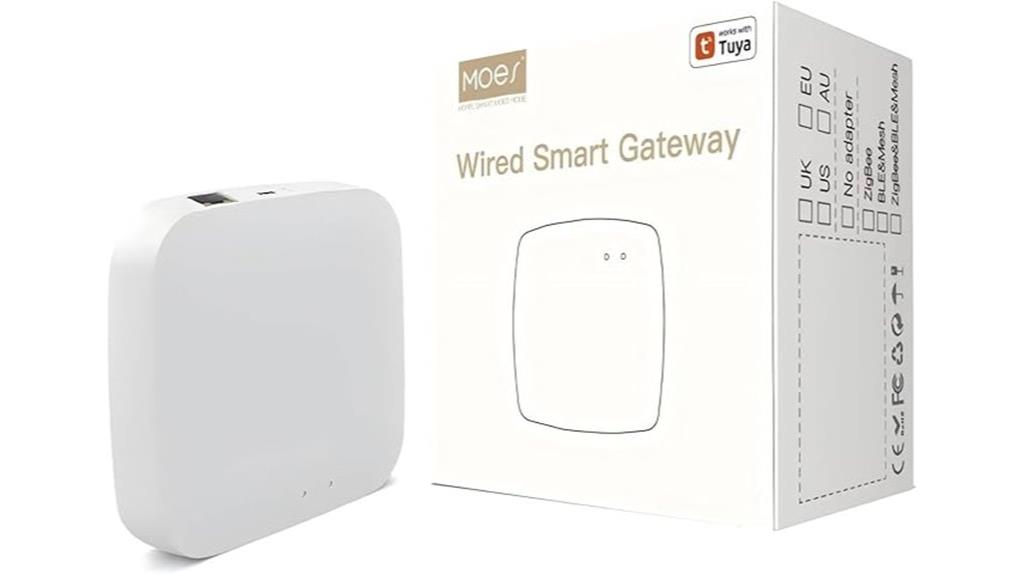
Looking for a reliable ZigBee hub to expand your smart home ecosystem? The MOES ZigBee 3.0 Hub/Wired Gateway offers a compact, wired solution with over 200 meters of coverage. You connect it via Ethernet or USB, making setup simple and flexible. It supports ZigBee 3.0, ensuring stable communication with compatible devices like sensors, lights, and plugs. The hub integrates smoothly with platforms like Tuya and Home Assistant, though some users report occasional disconnections. Bright activity LEDs might be distracting, and language barriers could pose challenges. Overall, it’s a practical choice for expanding your smart home, especially if you value affordability and straightforward ZigBee connectivity.
Best For: smart home enthusiasts seeking a reliable, affordable ZigBee hub with wide coverage and easy integration into existing ecosystems.
Pros:
- Supports ZigBee 3.0 for stable and reliable device connectivity
- Compact, wired design with over 200 meters of coverage
- Compatible with popular platforms like Tuya and Home Assistant
Cons:
- Bright activity LEDs can be overly luminous and distracting
- Occasional disconnection issues with certain devices or bulbs
- Language barrier with no option to switch the interface to English
Hub Mini Smart Home Hub for Alexa, SmartThings, Philips Hue, Nanoleaf, Govee
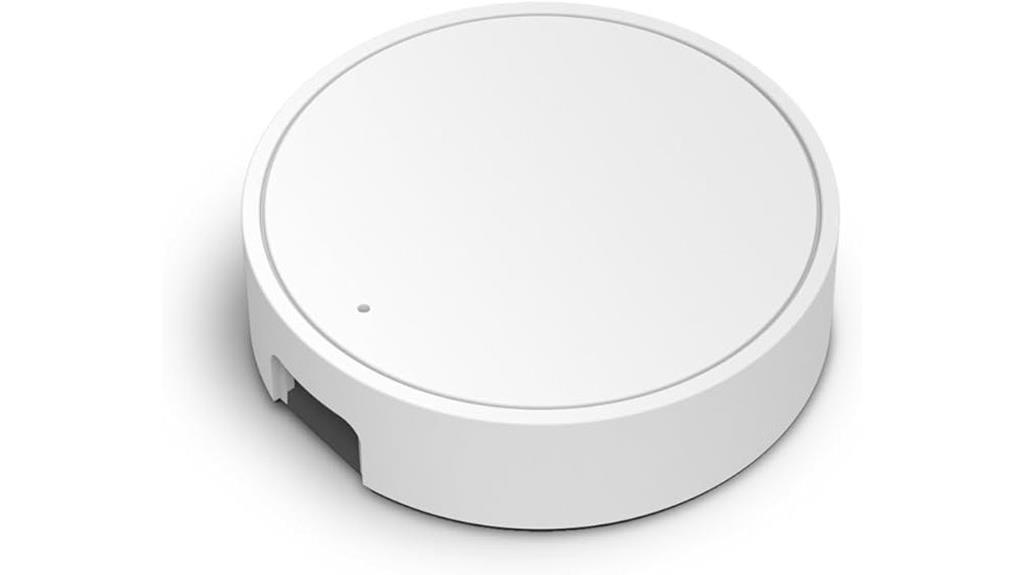
The Hub Mini Smart Home Hub is an ideal choice if you want a compact, reliable device that seamlessly connects your smart home ecosystem. It supports popular platforms like Alexa, SmartThings, Philips Hue, Nanoleaf, and Govee, making device management effortless. Its small size—just 1.89 x 1.89 x 0.53 inches—allows it to blend into any space without clutter. With long-range connectivity up to 50 meters and response times under 0.1 seconds, you get quick, dependable automation. Plus, it operates efficiently with a battery life of over two years for connected Flic Controllers, reducing maintenance and ensuring continuous control.
Best For: smart home enthusiasts seeking a compact, reliable hub that seamlessly integrates with popular platforms like Alexa, SmartThings, Philips Hue, Nanoleaf, and Govee for effortless device control and automation.
Pros:
- Compact design (1.89 x 1.89 x 0.53 inches) fits discreetly into any home setup
- Long-range connectivity up to 50 meters with ultra-fast response times under 0.1 seconds
- Over two years of battery life for connected Flic Controllers reduces maintenance needs
Cons:
- Limited to controlling compatible devices and controllers, may require additional accessories
- Customer rating of 4.2 out of 5 stars suggests some users may experience issues
- Released recently (August 6, 2024), so long-term reliability and updates are yet to be fully established
Aqara Smart Hub M3 for Home Automation

If you prioritize reliable local control and seamless integration across multiple ecosystems, the Aqara Smart Hub M3 stands out as an excellent choice. It supports Zigbee, Thread, Wi-Fi, Bluetooth, IR, and Matter, functioning as a Matter controller and Thread border router. This allows you to connect up to 127 Aqara Zigbee devices and 127 Thread devices with repeaters. Designed for local automation, it works independently of the internet and integrates easily with Apple HomeKit, Alexa, SmartThings, and IFTTT. With straightforward setup, stable connectivity, and privacy-focused features, the M3 provides a robust hub for comprehensive smart home automation.
Best For: smart home enthusiasts seeking reliable local control, seamless multi-ecosystem integration, and support for Zigbee, Thread, and Matter protocols.
Pros:
- Supports multiple protocols including Zigbee, Thread, Wi-Fi, Bluetooth, IR, and Matter for versatile device compatibility.
- Emphasizes local automation with no reliance on internet, ensuring privacy and stability.
- Easy setup with stable connectivity, integrating effortlessly with Apple HomeKit, Alexa, SmartThings, and IFTTT.
Cons:
- Limited support for third-party Zigbee devices, restricting device compatibility outside Aqara ecosystem.
- Zigbee range is relatively short (around 60-65 feet), requiring additional hubs or extenders for larger homes.
- User interface in the app can be confusing, with device-specific dashboards and limited multi-user management.
ZigBee 3.0 Hub WiFi & Bluetooth Gateway, Tuya Smart Bridge
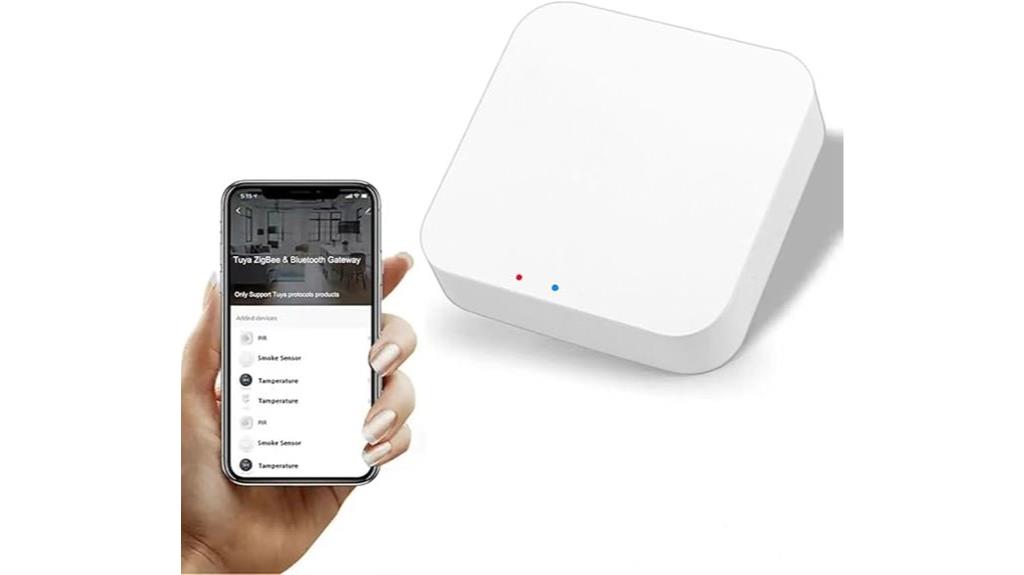
For those seeking an affordable yet reliable smart home hub, the ZigBee 3.0 Hub WiFi & Bluetooth Gateway by Tuya offers a versatile solution. It supports ZigBee 3.0 and Bluetooth 5.0, connecting most smart devices within these protocols. Compatible only with Tuya Smart devices, it works with the Smart Life or Tuya Smart App but excludes some like blinds, certain bulbs, and locks. Easy to set up via the app, it connects wirelessly through WiFi (2.4GHz only) and is powered by Micro-USB. Compact and lightweight, it delivers stable coverage and quick device pairing, making your smart home automation straightforward and affordable.
Best For: smart home enthusiasts seeking an affordable, easy-to-install hub that supports ZigBee and Bluetooth devices within the Tuya ecosystem.
Pros:
- Supports both ZigBee 3.0 and Bluetooth 5.0 for versatile device connectivity
- Easy wireless setup via app without the need for network cables
- Compatible with Amazon Alexa and Google Assistant for voice control
Cons:
- Only compatible with Tuya Smart devices, limiting device options
- Not compatible with 5GHz WiFi networks or certain device types like blinds and locks
- Requires a stable 2.4GHz WiFi connection for optimal performance
Smart Multi-mode Gateway with ZigBee 3.0, Bluetooth, Mesh Hub, and Voice Control
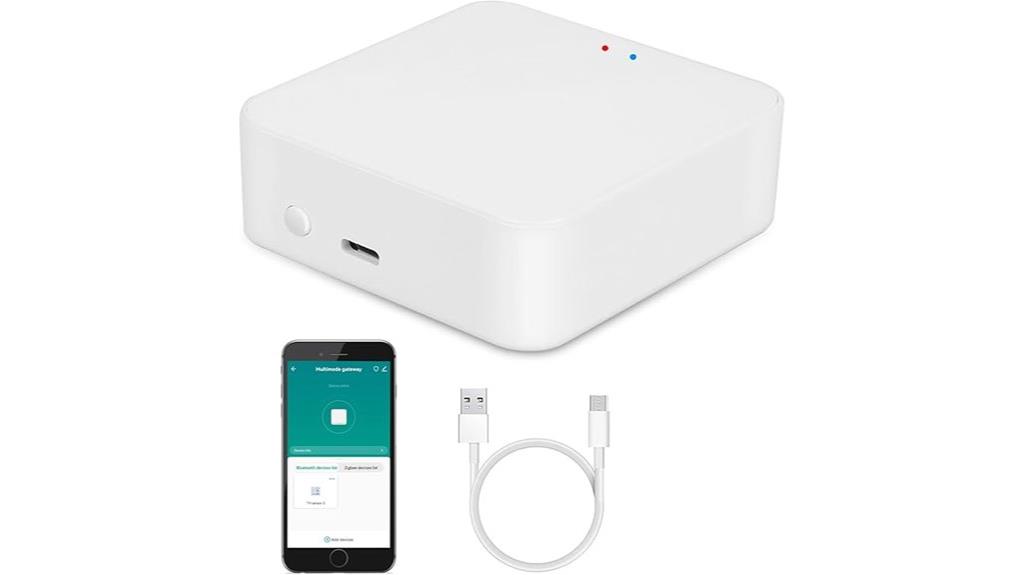
A smart multi-mode gateway with ZigBee 3.0, Bluetooth, Mesh Hub, and voice control is ideal if you want a versatile control center that seamlessly integrates a wide range of smart home devices. It supports up to 128 Tuya-compatible gadgets, including sensors, leak detectors, and BLE thermometers. Setting it up is simple—just power it on and connect through the Tuya Smart or Smart Life app. It enables device grouping, automation, and third-party control, working over ZigBee, Bluetooth, and Wi-Fi networks. Plus, voice commands via Alexa or Google Home let you control your devices hands-free, making your smart home more convenient.
Best For: smart home enthusiasts seeking an affordable, easy-to-use hub that integrates ZigBee, Bluetooth, and Wi-Fi devices with voice control capabilities.
Pros:
- Supports up to 128 Tuya-compatible devices, offering broad compatibility.
- Easy setup with no network cables required—just power on and connect via app.
- Enables seamless automation, device grouping, and voice control through Alexa and Google Home.
Cons:
- Limited compatibility with third-party apps outside the Tuya/Smart Life ecosystem.
- Some users report difficulty finding compatible bulbs or peripherals.
- Basic features may lack advanced customization options found in higher-end hubs.
Smart Hub Gateway, Wi-Fi & Zigbee & Bluetooth Mesh Controller
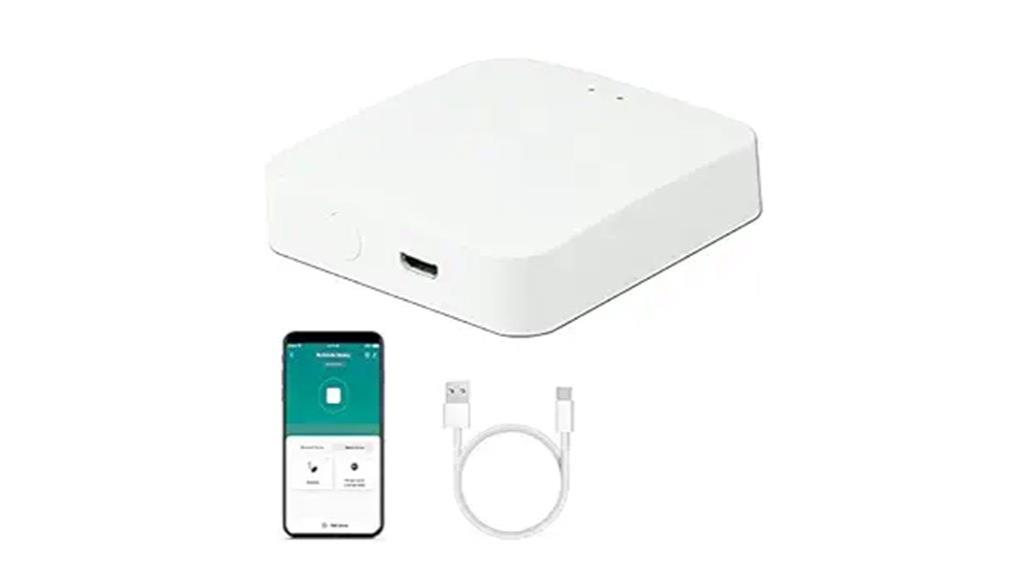
Looking to simplify your smart home setup with multiple device protocols? A smart hub gateway that supports Wi-Fi, Zigbee, and Bluetooth Mesh lets you control diverse devices through a single platform. With compatibility for up to 128 devices, it creates a comprehensive and stable ecosystem. You can manage devices easily via the Smart Life/Tuya app, whether you’re at home or away, and use voice commands with Alexa, Google Assistant, or Siri for effortless control. The hub also enables scene creation and device linking, automating interactions between Zigbee, Bluetooth, and Wi-Fi devices for seamless smart home operation. Plus, it offers enhanced security and a 24-month warranty for peace of mind.
Best For: smart homeowners seeking a comprehensive, multi-protocol hub to unify and automate diverse smart devices with easy app, voice, and scene control.
Pros:
- Supports multiple protocols (Wi-Fi, Zigbee, Bluetooth Mesh) for versatile device compatibility
- Enables remote management and voice control through popular platforms like Alexa, Google Assistant, and Siri
- Facilitates scene creation and device linking for seamless automation across different device types
Cons:
- May require initial setup and configuration for optimal integration
- Limited to supporting up to 128 devices, which might be restrictive for very large smart homes
- Dependence on the Smart Life/Tuya app, which may have occasional connectivity or update issues
SONOFF Zigbee Bridge Pro Hub, ZigBee 3.0 Smart Gateway
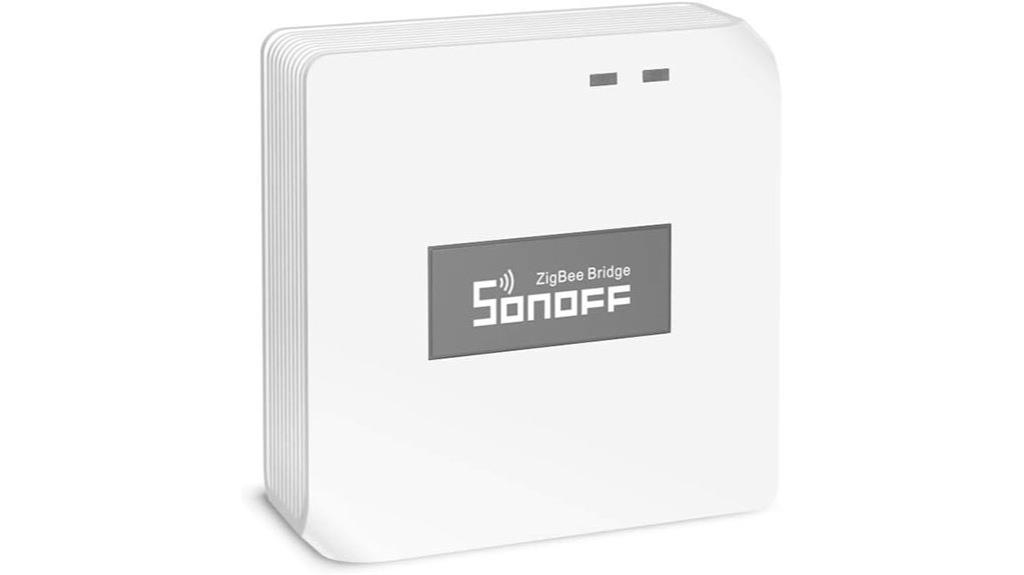
The SONOFF Zigbee Bridge Pro Hub stands out for its ability to support up to 128 Zigbee devices, making it ideal for small households, remote cabins, or farms where reliable local automation matters. It connects Sonoff Zigbee products like smart switches and plugs, and supports dual Wi-Fi and Zigbee protocols for seamless device communication. You can run local scenes, schedules, and security modes independently of your internet. Setup is straightforward via the eWeLink app, with quick pairing and status indicators. Its compact design and reliable performance help extend mesh networks, ensuring stable connections across your smart home or remote property.
Best For: small households, remote cabins, or farms seeking reliable, local Zigbee automation with easy setup and extensive device support.
Pros:
- Supports up to 128 Zigbee devices, ideal for expanding smart home setups
- Enables local control of scenes, schedules, and security modes without internet dependence
- Compact design with straightforward setup via the eWeLink app and reliable performance
Cons:
- Compatibility issues with some third-party Zigbee devices like Aqara or Woolley plugs
- Proprietary ecosystem may limit seamless integration with non-Sonoff devices
- Requires planning and mesh extension with powered Zigbee devices for larger or complex environments
Ezlo Plus Smart Home Hub with Zigbee & Z-Wave

If you’re seeking a versatile smart home hub that supports both Zigbee and Z-Wave devices, the Ezlo Plus offers a compelling option. It supports Zigbee, Z-Wave, RF, and Wi-Fi, with compatibility for Alexa and Google Assistant. Using the MiOS operating system, it allows you to mix device brands, control through web or mobile apps, and create automations like scheduling lights or triggering scenes. Setup is straightforward with an Ethernet connection and in-app guidance. However, some users report delays, connectivity issues, and interface flaws. While suitable for basic control, advanced automation and reliability may fall short, making it better for simplified smart home needs.
Best For: users seeking a versatile, easy-to-set-up smart home hub that supports multiple wireless protocols and device brands for basic automation and control.
Pros:
- Supports a wide range of devices including Zigbee, Z-Wave, RF, and Wi-Fi for flexible integration.
- Compatible with popular voice assistants like Amazon Alexa and Google Assistant for voice control.
- Easy setup with in-app guidance and Ethernet connection, suitable for beginners.
Cons:
- Reports of delays, unresponsive devices, and automation failures reduce reliability.
- Interface flaws and app quality issues can hinder user experience and configuration.
- Compatibility with advanced devices like smart locks can be problematic, and ongoing stability concerns may require switching to more robust hubs.
ZigBee 3.0 Hub WiFi & Bluetooth Gateway, Tuya Smart Bridge

Need a reliable hub that seamlessly connects your ZigBee and Bluetooth smart devices? The Tuya Smart Bridge, with ZigBee 3.0 and Bluetooth 5.0 dual mode, supports most compatible devices via the Smart Life app. It’s easy to set up—just connect the Micro-USB power, press the button, and add your devices through the app. This compact gateway offers remote control, voice commands through Alexa and Google Assistant, and reliable coverage with low power consumption. Keep in mind it only works with Tuya-compatible devices, supports 2.4GHz WiFi, and excludes some device types like locks and certain bulbs.
Best For: smart home enthusiasts seeking an easy-to-setup, reliable hub to connect their ZigBee and Bluetooth devices within the Tuya ecosystem.
Pros:
- Supports both ZigBee 3.0 and Bluetooth 5.0 for broad device compatibility
- Easy installation via app with no network cable required, plus remote control and voice integration with Alexa and Google Assistant
- Compact design with low power consumption and stable coverage
Cons:
- Only compatible with Tuya Smart devices, excluding some categories like locks and certain bulbs
- Limited to 2.4GHz WiFi networks, not supporting 5GHz bands
- May experience minor glitches or device pairing issues from time to time
Home Assistant Zigbee and Thread USB Gateway (ZBT-1)

Looking to simplify your smart home setup with reliable connectivity? The Home Assistant Zigbee and Thread USB Gateway (ZBT-1) makes it easy. It seamlessly integrates with Home Assistant, supporting Zigbee now and future-proofing for Matter. You can quickly update firmware over USB, ensuring your devices stay current. Powered by the robust Silicon Labs EZSP v8 chipset, it offers strong signal transmission at +20 dBm. Its compact, unobtrusive design fits neatly into your system, functioning as a hub, dongle, or USB gateway with an antenna. Compatible with SkyConnect and ZBT branding, it’s a versatile, reliable choice for enhancing your smart home connectivity.
Best For: smart home enthusiasts seeking a reliable, future-proof Zigbee and Thread gateway that seamlessly integrates with Home Assistant.
Pros:
- Supports both Zigbee and future Matter protocols for versatile connectivity
- Easy firmware updates via USB for quick maintenance and upgrades
- Compact and unobtrusive design that fits seamlessly into home setups
Cons:
- Limited to Zigbee and Thread protocols; does not support other smart home standards natively
- May require technical knowledge for initial setup and firmware updates
- Compatibility primarily optimized for Home Assistant, potentially less integrated with other platforms
Factors to Consider When Choosing a Smart Home Hub With Zigbee
When selecting a smart home hub with Zigbee, you need to consider how well it works with your current devices and the protocols it supports. Think about the connectivity options it offers and how easy it is to set up and install. Additionally, look at its ecosystem integration features to ensure seamless control across your smart home.
Compatibility With Devices
Choosing a smart home hub with Zigbee requires careful attention to device compatibility, as not all hubs support the same range of products. You need to verify that the hub supports the specific Zigbee devices you plan to use, since compatibility can vary between brands and models. Check whether the hub supports only Zigbee 3.0 or includes earlier versions, which can impact device connectivity. It’s also important to see if the hub can integrate with third-party ecosystems like SmartThings, Home Assistant, or Apple HomeKit for broader device support. Be aware that some hubs only work with native Zigbee devices and may not support proprietary or non-standard products. Lastly, confirm if the hub receives firmware updates, which can enhance device compatibility and resolve issues over time.
Protocol Support Capabilities
A smart home hub’s protocol support determines how well it can connect and manage a variety of devices from different brands and technologies. To maximize compatibility, look for a hub that supports multiple protocols like Zigbee, Z-Wave, Wi-Fi, and Bluetooth. A hub with Zigbee 3.0 ensures secure, reliable, and interoperable device communication. Supporting additional standards like Thread or Bluetooth Mesh offers greater flexibility and scalability for your smart home network. Compatibility with emerging standards like Matter is also essential, as it allows seamless integration of third-party and future devices. The more comprehensive the protocol support, the easier it is to create a unified, future-proof smart home ecosystem that accommodates a wide range of devices and brands without hassle.
Connectivity Options Available
Selecting the right smart home hub with Zigbee support involves considering the available connectivity options, as these determine how easily your devices will communicate and integrate into your network. Most hubs support Zigbee, allowing wireless communication without relying solely on Wi-Fi or Bluetooth. Connectivity choices often include Ethernet, Wi-Fi, USB, and sometimes Power over Ethernet (PoE), offering flexible setup options. Dual-mode gateways combine Zigbee and Bluetooth, expanding device compatibility through a single hub. Many hubs support only 2.4GHz Wi-Fi, making it essential to ensure compatibility with your existing network. The connectivity range varies from 20 meters to 200 meters, depending on protocols and device placement. Evaluating these options helps you choose a hub that best fits your home’s size and your network setup.
Setup and Installation Ease
When setting up a smart home hub with Zigbee support, ease of installation hinges on features like app-based configuration, physical button pairing, and automatic device discovery. A user-friendly hub guides you with step-by-step instructions within the app, making setup straightforward even if you’re not tech-savvy. Compatibility with common Wi-Fi standards (2.4GHz or 5GHz) also influences how smoothly devices connect initially. Devices that require minimal wiring, such as USB or Ethernet, simplify installation, especially in complex home environments. Quick pairing options, like pressing a single button or scanning a QR code, significantly reduce setup time and frustration. Overall, choosing a hub with these features ensures a hassle-free, efficient installation process, letting you enjoy your smart home faster.
Ecosystem Integration Features
To ensure your smart home hub works seamlessly with your existing devices, it’s essential to verify that it supports your preferred ecosystems like Alexa, Google Home, Apple HomeKit, or SmartThings. Support for these ecosystems guarantees smooth device integration and simplifies control. Additionally, check if the hub offers multi-protocol support, such as Zigbee, Z-Wave, Thread, or Bluetooth, to maximize compatibility. Look for features like easy device addition, scene creation, and automation options that are compatible with your ecosystem’s app or platform. Confirm whether the hub provides local control and automation, reducing reliance on cloud services and boosting reliability. Lastly, consider compatibility with third-party ecosystem integrations or open standards like Matter to future-proof your setup and expand your device options.
Device Management Ease
A smart home hub that’s easy to manage makes controlling your Zigbee devices straightforward and stress-free. Look for an intuitive interface that simplifies device pairing, setup, and ongoing management. Compatibility with popular automation platforms and apps reduces setup time and makes controlling devices more seamless. Features like batch firmware updates, centralized dashboards, and device status indicators help you oversee your network efficiently. Automated grouping and scene creation enable you to manage multiple devices at once, saving time and effort. Clear troubleshooting tools and real-time status alerts allow you to quickly identify and resolve connectivity or configuration issues. An accessible management system ensures you spend less time fussing with devices and more time enjoying a smoothly functioning smart home.
Security and Privacy Measures
Choosing a smart home hub with Zigbee requires paying close attention to security and privacy features that safeguard your devices and data. Ensure the hub supports local control and automation to reduce your exposure to remote security threats. Look for encryption protocols like ZigBee AES-128 or WPA3, which protect data transmitted between your devices. Check if the hub offers firmware updates that patch vulnerabilities quickly and reliably. Privacy-focused features, such as data encryption at rest and limited sharing with third parties, are also essential. Additionally, verify if the hub supports multi-factor authentication or device access controls to prevent unauthorized access. Prioritizing these aspects helps keep your smart home secure and your personal information private.
Price and Value Considerations
Price and value are critical factors when selecting a smart home hub with Zigbee, as they directly affect your long-term investment. Basic models start around $10, but advanced hubs can cost over $100, so consider what features and performance level you need. When evaluating price, look at the number of compatible devices supported and the hub’s expandability to ensure it can grow with your smart home setup. Higher-priced hubs often provide better stability, faster response times, and more reliable connectivity, which can justify the extra cost. Cheaper options might lack features like multi-protocol support or local automation, leading to additional expenses for accessories or replacements. Striking a balance between price, features, and build quality helps maximize value and avoids overspending on unnecessary capabilities.
Conclusion
In 2025, choosing the right Zigbee hub means prioritizing seamless connectivity, multi-protocol support, and future-proof features. With options like voice control, large device networks, and robust security, you can create a reliable smart home ecosystem tailored to your needs. Consider your automation goals and compatibility preferences to pick the best hub. With the right device, you’ll enjoy effortless control and a smarter, more connected home experience every day.







